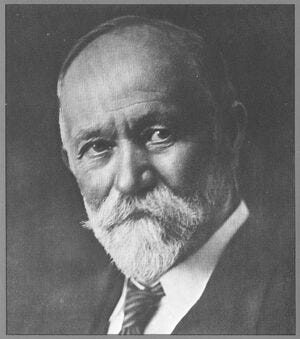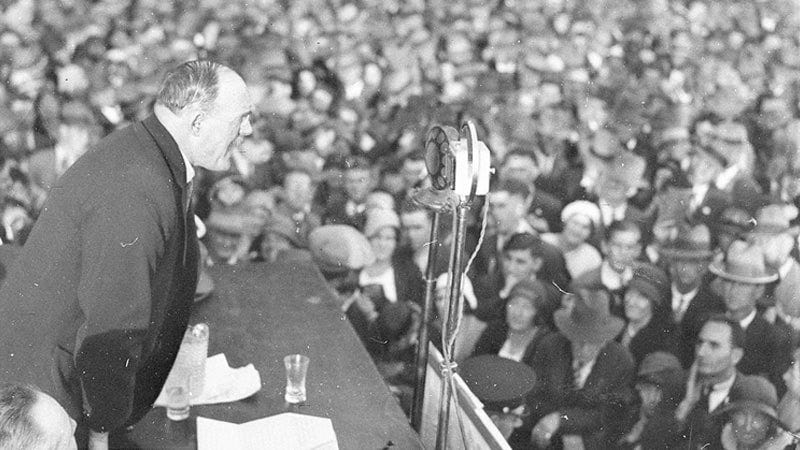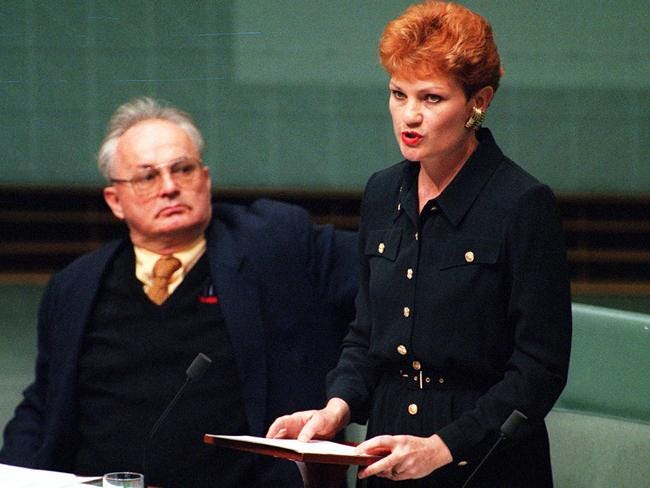Australia, like all modern Western nations, boasts proudly of its freedom. The second line of our national anthem proudly boasts “For we are one and free” and one of Australia’s major parties is even named after and constituted around an alleged commitment to ‘liberalism’ itself, an ideology which holds as its highest principle the rights and freedoms of each individual. One of the rights Australian’s are supposedly guaranteed is the freedom to take part in our nation’s political process via any peaceful means they choose - for example by protesting, commentating or standing for election.
Supposedly.
Our media frequently contrasts Australia’s alleged freedom with the tyranny of societies like China, Russia, various Islamic nations and the totalitarian regimes of Europe’s recent history. Why are these societies tyrannical? Our enlightened media class never misses an opportunity to point to factors such as state control of media and journalism, limited citizen participation in civic life and most of all, the fact that political dissent against the ruling regime is severely punished, that the rulers and regimes in these nations will dispense of political threats without a second thought or concern for due process.
I am sorry to be the bearer of bad news, but this dualistic picture of the world and history is entirely fabricated. Though Australia may not suffer from the same kind of tyranny as many of the before-mentioned examples, do not make the mistake of believing our’s to be a free land. In the same way North Koreans with no experience of the broader world may believe they are free, many Australians believe they are free simply because they have been told so, when in reality they simply have never tested their restraints.
We know these limits exist thanks to the principled work of political dissidents.
These dissidents, both past and present, left and right, traversed to the far limits of permitted political expression and in doing so served as an excellent barometer for political freedom. Throughout Australia’s history these dissidents have emerged from all corners of the political spectrum, for most of our history dissidents emerged from the economic left-wing. In the post-WW2 era however, we have witnessed even the furthest extremities of left-wing thought amalgamated into the political establishment, leaving right-wing opponents of progressive-liberalism the only meaningful political opposition to speak of. In 2023, across the whole Western world those who espouse a traditional or contrary belief regarding issues of race, gender, religion, history or science face slander and doxing, job loss, censorship, reputational attack and have even found themselves the victim of legal action and even arrest.
In Australia this is not a new phenomenon.
Below I have recorded the names and stories of six political dissidents from Australia’s history who presented meaningful, and purely ideological, opposition to the Australian regime of their time and paid the price for it. As much as I may disagree with the ideology, strategy or intention of any of these individuals, the retaliation they received from a supposedly free, democratic and liberal government is worth studying, especially for modern Australian dissidents.
William Guthrie Spence and the Labour movement
William Guthrie Spence, founder of the Australian Workers Union, was one of the quintessential figures of Australia’s ‘Labour’ movement, the movement from which both the Australian Labor Party and unionism were born. Many founding Labor Prime Ministers and pioneers either emerged from his union or worked alongside Spence in advocating the cause of unionism with Spence himself winning election as a member to the first ever House of Representatives. Mass marches and strikes were Spence’s methods of choice in advocating for an 8 hour work day, improved working conditions and immigration restriction.
Consequences
Hundreds of working union men were arrested and maltreated by police as their movement combated the interests of both wealthy landowners and politicians alike. The consequences suffered would most likely have been far worse had Spence’s movement not succeeded in its entry to politics. William Guthrie Spence’s book ‘Australia’s Awakening’ lists the names of 100 men arrested during the years 1891-94 in NSW and Queensland alone.
Fred Paterson and the Australian Communist Party
It may surprise most Australians to learn that not only did Australia have its own communist party, but that said party actually enjoyed some electoral success. The party, inspired by the Russian Revolution and the Soviet Communist government that followed it, held as its mission the propagation of Communism in Australia. The party went about achieving this goal by several methods, including but not limited to infiltration of established unions and the Labor Party as well as involving itself in various cultural battles. During a time when conservative, Christian and Anglo-Celtic values were the norm in Australia, Communists represented our country’s primary ideological dissidents.
Consequences
The communist party operated for 70 years and over that time experienced varying degrees of persecution and scrutiny by government and law enforcement. The most severe crackdowns came in 1940 when the party was officially banned by the Australian government, following this the homes of all known members were raided alongside the party office. As part of this historically large operation, police seized everything from documents to furniture, arrests were made and several high ranking party members received prison sentences for offences as minor as possessing party literature.
This crackdown was not isolated, for much of its history the party and its members remained under the watchful eye of law enforcement and Australian intelligence services.
Party leader Fred Paterson won the electorate of Bowen during Queensland’s 1944 state election only to have his electorate abolished in 1949 when it was divided in two, some historians believe this change was made intentionally to eliminate Paterson’s chance of re-election in 1950.
Jack Lang and the Labor Party
Jack Lang remains one of the most prominent Labor party premiers in Australian history and caused quite a stir during his time. Lang gathered what has since been described as a ‘cult of personality’ following and consequently made many enemies from every corner of politics; fascists, communists, within his own Labor party and the broader federal government. Lang was a committed man of the people and this led him to take such drastic actions as attempting to end banking in NSW altogether in an attempt to transform the state into a cash-only economy and thereby remove the pernicious influence of powerful bankers.
Consequences
As a result of his revolutionary actions he was forced to leave office under threat of arrest. Though many called on him to confront Australia’s military with the NSW police force the two forces being roughly equal in strength at the time, Lang, a principled pacifist ultimately resigned without bloodshed.
Percy R. Stephensen and the Australia First movement
Percy Stephenson was a lifelong political radical. Though he started his career of political activism a committed far-left socialist (he was actually a friend of Australian Communist Party leader, Fred Paterson) though is best remembered for his switch to far-right politics. During the 1930s Stephenson grew enamoured with European fascism and in 1941 stitched together an assortment of political radicals to found the Australia First movement. Stephenson also began writing heavily in support of national socialism, monarchism and, bizarrely, the integration of Aboriginal identity into Australian culture.
Consequences
During WW2, Australia First movement members were subjected to intense scrutiny by law enforcement. 20 members of the movement were arrested in 1942 upon the baseless suspicion they would aid the Japanese in the war. Multiple were imprisoned for the extent of the war, sometimes for reasons as dubious as visiting Japan years earlier or advocating an anti-war cause. Historian and Former Governor General Paul Hasluck described the imprisonment of movement members as the “grossest infringement of individual liberty made during the war”.
Dr Johannes Becker and the ‘Hitler Club’
“The Hitler Club” was not the name Dr Johannes Becker chose for his social club, the credit for that name belongs to a member of Australia’s secret service codenamed ‘A4’. Gary Gumpl in his evenhanded book on the topic gives a far less inflammatory description of the group; “In Australia the group that assembled under the swastika was little more than a fraternity of expatriates bemoaning the humiliations of Versailles and barracking for a team, led by Hitler, that was going to win back the trophy.” Dr Becker was a doctor of medicine who was also awarded a rank (but effectively no power) in the nazi party, despite living all the way on the other side of the world from Germany, in South Australia. In terms of operation the so called ‘hitler club’ was nothing more than a German social club and when interrogated Becker concurred with this description. Many members of the club were ideological National Socialists and in part represented a minor ideological challenge to the Allied powers.
Consequences
Dr Becker and many of his club members were interned during WW2 even despite Dr Becker’s cooperation with authorities, eleven years after Dr Becker had ceased holding any rank in the Nazi party he found himself deported from his country. For many years before and after this he was also unfairly targeted by various media publications.
Pauline Hanson and the One Nation party
Pauline Hanson is a name that needs no introduction in Australia, to most of the population her’s is the face of dissident right-wing politics. She began her political career as an unlikely winner in the 1996 election as the member for Oxley, Queensland. Shortly following this she founded the ‘One Nation’ party and in less than two years grew to the second largest vote-winner in the 1998 Queensland state election. Over time this has evolved and in 2023 Mrs Hanson can hardly be described as a dissident, having moderated her politics enormously since her early days standing against multiculturalism and mass immigration to Australia.
Consequences
Throughout her career Pauline Hanson has been expelled from the Liberal party for her controversial remarks regarding Aboriginals, spent 11 weeks in prison for a later overturned charge and recently had her party labelled a ‘hate group’ by the radically left-wing ‘Global Project against Hate and Extremism’ think-tank.
In addition to this, the early success of the One Nation party also served as part of the ‘Anti-Defamation Commission’s motivation to push for censorious racial vilification laws and Hanson’s party was the victim of an unprovoked doxing attack perpetrated by the ‘Australia/Israel Review’ which in 1998 leaked the names of roughly 2000 One Nation members and donors.
In light of all these examples a clear pattern emerges, meaningful disagreement with the established status-quo is not acceptable in our democracy. I would like to draw the attention of those who believe this persecution of dissidents is a fact of the past to some recent developments within the political arena. Individuals like Moira Deeming, George Christiansen & Bernie Finn, all of whom were expelled by the supposedly centre-right Liberal party for their centre-right stances. In a time when winning an election without the backing of a major party is probably as likely as being struck by lightning twice, the narrow lanes of major party dogma all but throttle any chance of a genuine opposition to the establishment succeeding. Though Australia boasts many minor parties, our preferential voting system redirects all unused votes back into the major parties - meaning in effect your vote is almost always funnelled back into either the Labor or Liberal party. In practice this has the effect of constraining the votes of Christians and conservatives to a Liberal Party that kicks out elected representatives who hold a Christian, conservative stance on matters of gender, government power or abortion.
Yet, even after reading the nine examples I listed above, some will still attempt to rationalise the tyranny of our present ‘democratic’ system claiming that in the 21st century governments, corporations and nonprofits across the Western world work to silence the speech and political freedom of dissidents so as to protect the sensibilities of any potentially offended onlooker. This is ludicrous of course, standards are enforced entirely differently dependant on ideology. Critique or ridicule of Christianity is encouraged, while the same is punished in the case of Islam or Judaism. The ‘Black Lives Matter’ slogan is held as uncontroversial, but an equivalent slogan pertaining to Whites is ‘controversial’ and ‘hateful’. Dissenting ideas and individuals are censored even when presented in a safe and non-confrontational manner, while approved ideas and individuals face little to no consequences even when presenting in a repugnant, offensive or outright violent manner.
Dissident political speech is not discouraged because of the offence it causes, dissident political speech is blacklisted because of the political threat it poses to the established regime - Australia is no exception. Every regime has its political enemies, Democracy is the only regime that deceitfully claims otherwise.










